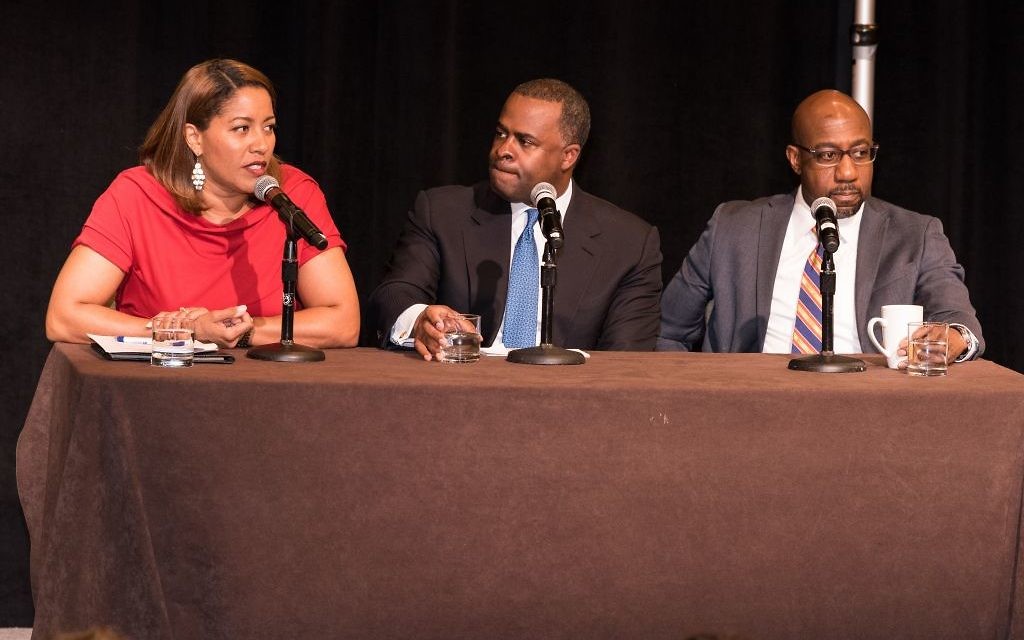Reform Rabbis Find Civil Rights Inspiration
Atlanta offers southern hospitality to over 500 Rabbis during the Central Conference of American Rabbis.
There were many kippot and long, dark, curly heads and even some kippot on long, curly locks along Peachtree Street from March 19 to 22 as Atlanta played host to the annual convention of the largest rabbinical association in the world, the Reform movement’s Central Conference of American Rabbis.
More than 500 visiting rabbis were treated to Southern hospitality and the best of Atlanta.
“It has been a wonderful experience for all the Atlanta rabbis to welcome our colleagues and to give them a taste of the best of what our beautiful city has to offer, most especially to share dear friends with our colleagues, like Mayor Reed and Reverend Warnock, and our best and brightest teachers, such as Deborah Lipstadt, Ken Stein and Paul Wolpe, to name just a few,” said Rabbi Peter Berg of The Temple.
Get The AJT Newsletter by email and never miss our top stories Free Sign Up
In his presentation to the convention, Atlanta Mayor Kasim Reed drove home the strong relationship he has with the Jewish community.
Asked by a convention attendee how Jews should respond when they see potential allies involved in anti-Semitic behavior, Reed was unequivocal: “Call me. I can hold my own community accountable. Let us take a forward-looking position.”
He noted that when Black Lives Matter activists demanded that he break the relationship between Atlanta and Israeli police, he immediately refused.
Reed encouraged rabbis to build friendships like the one he has with Rabbi Berg and to “reach out to people you respect and have a conversation.”
For Rabbi Beth Singer of Congregation Emanu-El in San Francisco, who is deeply involved in civil rights in California, “Nothing beats the experience of attending worship services at the Ebenezer Baptist Church with Reverend Warnock. Dr. King’s sister was in the congregation with hundreds of other exuberant worshippers. Being in a room filled with blacks, Jews and a shared passion for G-d’s spirit of justice was a taste of how things should always be everywhere.”
Justice was an important theme throughout the convention, which included an address by Southern Poverty Law Center co-founder Joseph J. Levin Jr., himself a Reform Jew, who spoke of the broad rise in hatred and discrimination in the recent past and compared the current environment to his own experiences growing up during segregation. “We have seen a rejection of diversity. Arguably we are back to an era where bias is not hidden, but open and explicit.”
The Jim Crow era and the role of Jews in the fight for civil rights were brought home with visits to the National Center for Civil and Human Rights and to The Temple for an exclusive showing of “The Temple Bombing” in the sanctuary.
Rabbi Larry Bach of Judea Reform Congregation in Durham, N.C., said those experiences were a strong reminder of what inspires his rabbinate.
According to all who were interviewed, one of the most power elements of the convention was the act of being together, connecting with colleagues and friends, discussing the challenges of the modern rabbinate, and getting inspiration.
“One cannot be a Jew alone,” said Temple Sinai Rabbi Ron Segal, who moved up to the position of CCAR president-elect during the convention.
“The presence of community is essential for us to fulfill our ritual, emotional and spiritual needs as Jews. The same is certainly true for rabbis as well,” Rabbi Segal said. “In a professional calling which can be isolating and even a bit lonely at times, our annual CCAR convention provides an important opportunity for rabbinic colleagues to come together and experience an educationally rich and spiritually rejuvenating sense of community. And when our Jewish world is encountering challenges and external threats which demand a strong and unified voice and response, the importance of being together as a community of rabbis is even more vital, as we can learn from expert teachers, leaders and thinkers about when and how best to use our collective rabbinic voices.”





comments